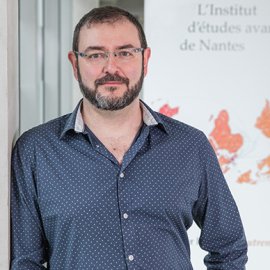Ecole Normale Supérieure, Paris

Octobre 2020 à Juin 2021
After graduating with a Master degree in Classics at the Sorbonne, Julien Dufour specializes in Arabic philology. His doctoral thesis (2007), prepared in Yemen, deals with Yemeni half- vernacular sung poetry. At the same time, he starts conducting fieldwork on the Yemeni dialects of Arabic as well as the Modern South Arabian languages (MSA). As a senior lecturer at the University of Strasbourg (2008-2019), he teaches Arabic linguistics while continuing to work on MSA as a member of the French-funded OmanSaM research project. His habilitation dissertation (2017) focuses on MSA historical morphophonology. Now a senior lecturer at the École normale supérieure, he is the scientific manager of the research project Almas “Ancient and modern languages of South Arabia".
Arabic Languages??: Linguistic history of the Middle East in the light of languages "Modern South Arabia"
The Arabian Peninsula stands in the centre of the area where the so-called ‘Semitic’ languages are spoken. The earliest written evidence of this linguistic family is as old as writing itself and, over the last five millennia, Semitic languages have expressed spiritual, scientific and literary experiences that have gained worldwide significance. In spite of this unequalled historical depth in the data, the history of the Semitic languages and, consequently, the linguistic history of the Middle East as a whole is still spotted with question marks.
However, the languages known as ‘Modern South Arabian’ (MSA) represent a promising field of research in this respect. They lack a written tradition and are spoken by only a few hundred thousand speakers in Yemen and Oman ; they are all considered endangered. As the only remnant of the linguistic diversity of the Arabian Peninsula before the spread of Arabic, their weight in the comparative study of the Semitic languages in diachrony is considerable. Although substantial advances have been achieved over the last decade, they remain understudied and insufficiently described. In particular, they still await a sound basis for their integration into Semitic comparative linguistics, an absolute prerequisite in order to determine what MSA can tell us about the linguistic history of the region. This is the aim of Julien Dufour’s research project.